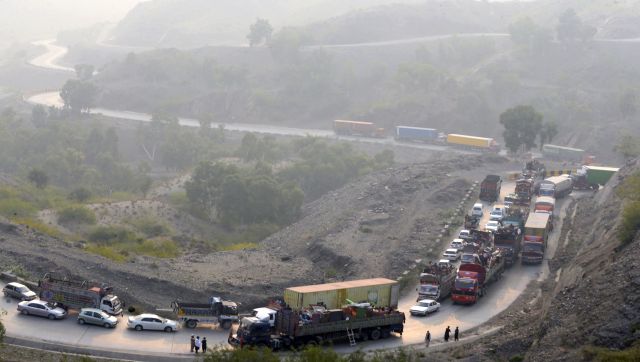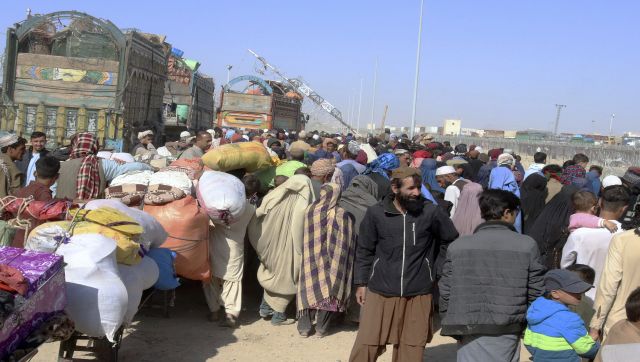Today is D-Day for Pakistan. It’s from today (1 November) that Islamabad will start cracking down on undocumented immigrants, including nearly two million Afghan nationals. And ahead of this, tens of thousands of Afghan migrants could be seen rushing to the borders on trucks and other vehicles, in an attempt to escape arrest or forcible expulsion. Near Karachi’s Sohrab Goth area – home to one of Pakistan’s largest Afghan settlements – a bus service operator told Reuters that he had begun extra services to cope with the exodus. “Before I used to run one bus a week, now we have four to five a week,” he was quoted as saying. But why the forced exodus? What caused Pakistan to take such a decision? And more importantly, what happens to ties between the two neighbouring countries?
What was Pakistan’s leave order? On October 3,
Pakistan ’s Interior Ministry had announced that all migrants living without legal status in Pakistan had 28 days to leave voluntarily or face deportation. “All foreign nationals living illegally in the country have been given until 1 November to leave voluntarily or face deportation,” said caretaker Interior Minister Sarfraz Bugti. He said the measures were being taken against the backdrop of a surge in terror attacks on Pakistan soil. While the government emphasised that the move was being taken against all illegal migrants, many have seen the step to be targeting those who have moved from Afghanistan. As of date, data reveals that Pakistan is home to nearly four million foreigners, a large number of them being Afghan nationals, who fled the war-torn country after the Soviet invasion of Afghanistan in the 1980s. More recently, after the Taliban regained power in 2021, Pakistani officials say between 600,000 to 800,000 Afghans migrated to Pakistan. The Pakistani government claims nearly 1.7 million of those Afghans are undocumented. Following the announcement by the Pakistan government, several Afghan refugees have been pressured to leave, according to human rights groups. Afghans have suddenly been evicted from their homes by landlords; employers are firing their undocumented Afghan workers and the police are raiding neighbourhoods popular among Afghans, arresting those without paperwork. [caption id=“attachment_13326752” align=“alignnone” width=“640”] Afghan families walk toward a border crossing point in Torkham, Pakistan. Large numbers of Afghans have crammed into trucks and buses in Pakistan, heading to the border to return home hours before the expiration of a Pakistani government deadline for those who are in the country illegally to leave or face deportation. AP[/caption] Shortly after the announcement, there’s been a flood of Afghans at the border crossings – about 4,000 people have been repatriating daily, more than 10 times the number before the deportation policy was announced, according to aid groups. Voicing the fear of returning to Pakistan, one Afghan woman told the BBC, “I am studying here in Pakistan and I wish to continue my education here. If we are forced to leave, I will not be able to continue my study in Afghanistan. My parents, my sister and brother are scared about the future.” Nazir Ahmadi, who had worked with NATO-funded projects in Afghanistan and has been in Pakistan for the past 18 months told Human Rights Watch: “I have nothing there. I have lost everything. If I go back to Afghanistan, there’s also no guarantee for me to stay alive.” Another Afghan national, Khan Afzal Wafadar, who left Pakistan after his boss told him to either provide legal immigration documents told the New York Times, “There’s a Pashtun proverb: ‘If your bed belongs to another person, they have the power to take it from you in the middle of the night’,” Wafadar said. “It’s their country; they can kick us out at any time.” Why has Pakistan ordered them to leave? But what is the reason for Pakistan to oust such a large number of people from their land? Islamabad has said that the move comes owing to the rising number of terrorist attacks. They added that there has been a significant spike in attacks – there have been 24 suicide attacks since January, 14 of these 24 were carried by Afghan nationals, Bugti had said earlier. Data collected and analysed by South Asian Terrorism Portal also revealed that in this year alone, Pakistan has already witnessed 418 terror attacks, compared to 365 from last year. In fact, Pakistan has accused the
Taliban government of giving safe haven to militant groups that carry out these attacks, such as the
Pakistani Taliban (TTP). This alone has caused relationships between the two countries to sour in recent times. Political analyst Hasan Askari told AFP, “The Taliban government is not really listening to Pakistan about the TTP’s presence on its soil. Pakistan wants them to be contained and the Taliban are unable and unwilling to do so. But it’s not just the rise in terror attacks that has led to Pakistan taking such a step. The country is in the midst of its worst
economic crisis . Inflation has risen to a high of 31.4 per cent; the cost of foodgrains and other essentials have skyrocketed. [caption id=“attachment_13326782” align=“alignnone” width=“640”]
An Afghan refugee man passes an infant to his father from a truck, as they are returning home after Pakistan issued a forced deportation order. Reuters[/caption] And amid this situation, many Pakistanis blame Afghan nationals of ‘stealing jobs’. Pakistan hopes that with the deportation of nearly two million Afghans, unemployment will reduce in the country and give a boost to the country’s economy. Some analysts also note that Pakistan’s move of ridding Afghan nationals is more of a pressure tactic to make Kabul fulfill a range of Pakistani demands. How has the Taliban government reacted? The Taliban, which governs Afghanistan, has expressed its unhappiness at Pakistan’s announcement, calling “unacceptable”. The government spokesperson Zabihullah Mujahid had urged the Pakistani government to “reconsider the decision“. Afghan refugees are not involved in Pakistan’s security problems, he said on X, adding that Pakistan “should tolerate them”. Incidentally, this isn’t the first time that Pakistan is taking such a step. During a 2016 campaign, more than 600,000 Afghan immigrants, both registered and undocumented, returned to their country, according to data compiled by the United Nations High Commissioner for Refugees (UNHCR). [caption id=“attachment_13326842” align=“alignnone” width=“640”]
 A convoy of trucks carrying Afghan families drive toward a border crossing point in Torkham, Pakistan. AP[/caption] A Human Rights Watch report from 2017 called it the “world’s largest unlawful mass forced return of refugees in recent times”. Hameed Hakimi, associate fellow at the Asia-Pacific Programme and Europe Programme at Chatham House, told TIME: “To deflect blame from the challenges that the government or the country overall is facing, they always raised the issue of illegal immigrants chiefly from Afghanistan.” What do human rights groups say? The UNHCR has said the move could trigger a “human rights catastrophe.” Other rights watchdogs have also criticised the move by Pakistan to force asylum-seekers to leave. Zaman Soltani, a South Asia researcher at Amnesty International, told Radio Azadi on 4 October that Islamabad should immediately reverse its decision. “We demand that any forced deportation of migrants and those who seek asylum be halted,” Soltani said. “Those who fled Afghanistan are asking for asylum and protection in Pakistan.” “Most of these asylum seekers are former government employees, activists, journalists, or others who are facing threats, torture, and detention by the Taliban in Afghanistan,” Soltani added. [caption id=“attachment_13326852” align=“alignnone” width=“640”]
A convoy of trucks carrying Afghan families drive toward a border crossing point in Torkham, Pakistan. AP[/caption] A Human Rights Watch report from 2017 called it the “world’s largest unlawful mass forced return of refugees in recent times”. Hameed Hakimi, associate fellow at the Asia-Pacific Programme and Europe Programme at Chatham House, told TIME: “To deflect blame from the challenges that the government or the country overall is facing, they always raised the issue of illegal immigrants chiefly from Afghanistan.” What do human rights groups say? The UNHCR has said the move could trigger a “human rights catastrophe.” Other rights watchdogs have also criticised the move by Pakistan to force asylum-seekers to leave. Zaman Soltani, a South Asia researcher at Amnesty International, told Radio Azadi on 4 October that Islamabad should immediately reverse its decision. “We demand that any forced deportation of migrants and those who seek asylum be halted,” Soltani said. “Those who fled Afghanistan are asking for asylum and protection in Pakistan.” “Most of these asylum seekers are former government employees, activists, journalists, or others who are facing threats, torture, and detention by the Taliban in Afghanistan,” Soltani added. [caption id=“attachment_13326852” align=“alignnone” width=“640”] Human rights watchdogs have also criticised the move by Pakistan to force asylum-seekers to leave, calling it a human catastrophe. AP[/caption] What happens next? Pakistan has doubled down on its policy despite receiving flak and have established several deportation centres nationwide, signalling the government’s seriousness about detaining and repatriating Afghans. A day ago, Pakistani minister Bugti also told the media that authorities would strictly begin tracking and arresting foreigners staying in the country without registration or documents and move them to temporary centres where they would be provided with basic needs such as medical care and accommodation. He added that the expulsion of illegal foreign nationals would be carried out in phases, and people with no travel documents will be deported in the first phase.
**Also read: Vantage | Why refugee exodus can change Pak-Afghan relations forever** The minister said that the government will decide the border of deportation for “undocumented migrants,” adding that any migrants in Pakistan illegally should go back to their countries voluntarily to avoid mass arrest and forced deportation. Islamabad has also rejected the criticism from human rights groups saying the move was compliant with international norms and principles. Foreign office spokesperson Mumtaz Zahra Baloch said: “The decision is in exercise of Pakistan’s sovereign domestic laws.” With inputs from agencies
Human rights watchdogs have also criticised the move by Pakistan to force asylum-seekers to leave, calling it a human catastrophe. AP[/caption] What happens next? Pakistan has doubled down on its policy despite receiving flak and have established several deportation centres nationwide, signalling the government’s seriousness about detaining and repatriating Afghans. A day ago, Pakistani minister Bugti also told the media that authorities would strictly begin tracking and arresting foreigners staying in the country without registration or documents and move them to temporary centres where they would be provided with basic needs such as medical care and accommodation. He added that the expulsion of illegal foreign nationals would be carried out in phases, and people with no travel documents will be deported in the first phase.
**Also read: Vantage | Why refugee exodus can change Pak-Afghan relations forever** The minister said that the government will decide the border of deportation for “undocumented migrants,” adding that any migrants in Pakistan illegally should go back to their countries voluntarily to avoid mass arrest and forced deportation. Islamabad has also rejected the criticism from human rights groups saying the move was compliant with international norms and principles. Foreign office spokesperson Mumtaz Zahra Baloch said: “The decision is in exercise of Pakistan’s sovereign domestic laws.” With inputs from agencies


)

)
)
)
)
)
)
)
)



